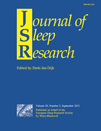Long-term effectiveness of cognitive–behavioural self-help intervention for nightmares
Summary
Nightmares are a prevalent disorder leading to daily impairments. Two cognitive–behavioural self-help interventions – imagery rehearsal and exposure – recently showed short-term efficacy compared to a waiting-list and a group that recorded their nightmares. This paper reports the long-term results of the imagery rehearsal (n = 103) and exposure (n = 95) interventions. Participants were assigned randomly to a condition after completing baseline measurements; they received a 6-week self-help intervention and completed questionnaires 4, 16 and 42 weeks after end of treatment. Initial effects on nightmare measures were almost completely sustained after 42 weeks (d = 0.50–0.70); no differences were found between exposure and imagery rehearsal therapy. These results suggest that nightmares should be targeted specifically and that an internet-delivered self-help intervention seems to be a good first option in a stepped-care model.




